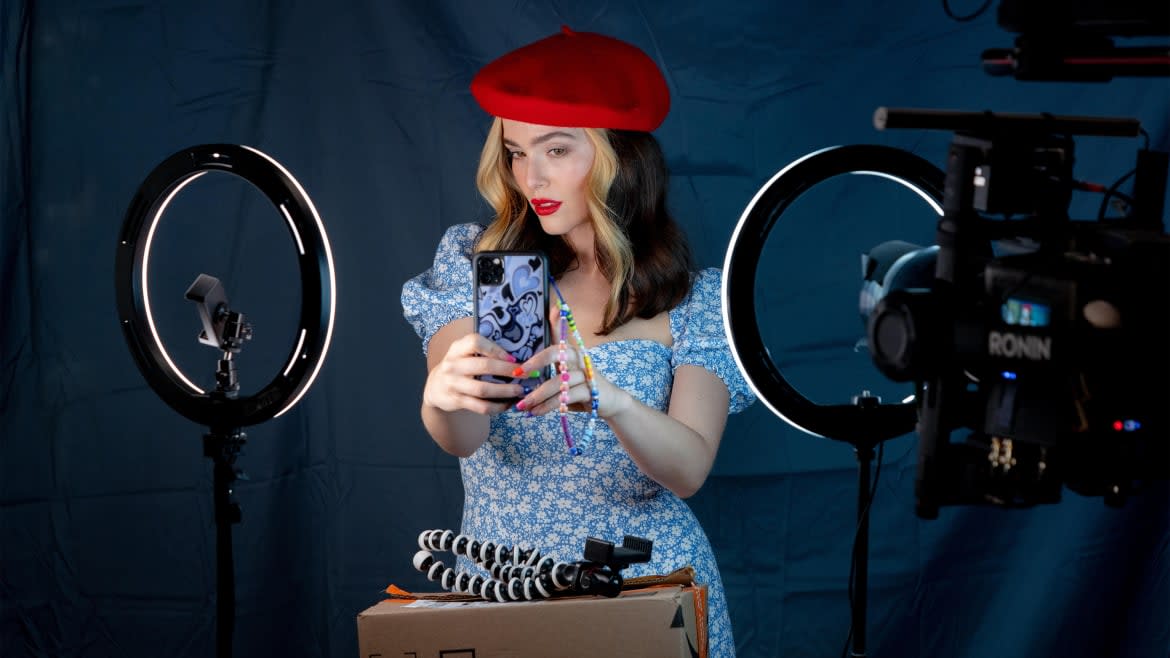The Biggest Problem With Hulu’s ‘Not Okay’—and How It Could’ve Been Fixed

It’s about one-third of the way into Not Okay that the most interesting character finally shows up.
In the film, which is now available on Hulu, Rowan Aldren (Mia Isaac) is a New York City teenager who’s part of a support group for survivors of violence. Self-possessed and confident beyond her years, she’s become an avatar for the gun control battle after surviving a mass shooting at her school. High-profile rallies are as much a part of her schedule as group projects.
Somewhere between classes, her weekly support meetings, and sessions at a rage room—where she smashes household objects with a bat to vent her frustration—she finds the time to deliver impassioned speeches calling for stricter gun laws. She lays the blame for massacres like the one she survived at the feet of politicians who, in her view, have decided to trade the lives of young people for votes. She does this knowing that it puts her at physical and psychological risk. Every speech means reliving the horror of hearing her classmates be executed one by one. At school, a lockdown drill accompanied by a loud siren and instructions to hide under her desk induces shallow breathing and a clear look of dread.
Not Okay is a cautionary tale about notoriety, particularly on social media, and how seeking it and nurturing it can harm you. It’s also about someone far less captivating—and whose story is less worth telling—than Rowan.
‘Not Okay’ Is a Big Waste of Dylan O’Brien’s Time
Danni Sanders (Zoey Deutch) is an irritating young photo editor with an equally irksome name who wants to be a writer but shows no aptitude and no capacity for introspection. (Her essay about how “sad” she is gets turned down, in part, because she complains about not being able to trauma-bond with her friends about the Sept. 11 attacks—she was out on vacation at the time.)
Desperate for attention and better material, she hides out in her apartment and edits pictures of herself on social media to make it look like she’s in France. When a terrorist attack hits the Arc de Triomphe, where she “took a selfie” minutes before, she runs with it instead of coming clean. Her thick web of lies leads her to Rowan’s support group, where she mines their pain for details that she’ll use in an article that will later go viral, garnering her the same notoriety as her new friend.
Writer-director Quinn Shepherd does a great job at fleshing out the contours of this self-obsessed, offensive character, and Deutch imbues her quippy one-liners with enough zest to keep the audience from giving up on whatever journey she’s about to go on. But there’s a more compelling character here than the aimless and unsatisfied twentysomething who lies for attention. There may also be a better, albeit darker, movie.
It’s not always the fairest criticism to say “I wish this movie was a different movie instead.” But after watching Not Okay, I can’t stop thinking about Rowan’s lost potential.
Rowan has a worthy cause. She’s a survivor using her voice to honor her classmates and prevent people, especially those in power, from forgetting about them. She’s also, just like Danni, actively courting fame.
When Danni checks out her Instagram page, the Stories circle is lit up, suggesting that she actively engages with her half a million followers on a daily basis. She’s deified in the press, where hyperbolic headlines anoint her “our role model forever” and one graphic frames her determined face in a warm, orange halo. Right-wing trolls interrupt one of her rallies by lighting fireworks on the stage, sending her and the panicked crowd running for cover. Afterwards, she lies on a hospital bed worrying that the “alt-right” will “crucify” her and that it will reflect badly on the movement. On social media, people peddle conspiracy theories that she was never in a shooting to begin with.
There are now multiple mass shootings a week in the United States. They’ve become such a regular part of our culture and news-consumption cycle that they’re now birthing public figures. In Not Okay, the parallels between Rowan’s major speech and X Gonzalez’s urgent “We Call BS” plea for gun reform are stark.
Caroline Calloway’s Cameo in ‘Not Okay’ Is Simultaneously Brilliant and Terrible
Aalayah Eastmond, David Hogg, and Gonzalez, who survived the 2018 Parkland shooting, were immediately elevated to celebrity status, sitting down for glowing profiles in major outlets, going on a nationwide tour in support of stricter gun laws, and becoming the subject of hatred and lies for those who saw them as a threat to the Second Amendment. That burden, taken on during what were supposed to be their most irresponsible and carefree years, is worth exploring. But Not Okay is more interested in, and comfortable with, Danni’s vapid search for personal fulfillment. The utter repugnance of what she does—co-opting real survivors’ pain for personal gain—leaves little room to analyze Rowan’s motives.
Why did she, out of all her classmates, become the face of this movement? Why does she stay in it? Does she see (or even want) a way out? In Not Okay, Rowan is just the angel to Danni’s devil. This Manichean distinction sidesteps a more gripping and timely probe that will only become more relevant as time goes on.
Don’t get me wrong, Not Okay is fun weeknight viewing. It features one of the most realistic depictions of Brooklyn I’ve seen in a while (shout-out to Bushwick), and the quick pace keeps it more engaging than my Instagram feed (a big metric for me these days). There’s just too much truth and pain in Rowan’s battle with notoriety for it to be sidelined in favor of a one-dimensional narcissist.
Get the Daily Beast's biggest scoops and scandals delivered right to your inbox. Sign up now.
Stay informed and gain unlimited access to the Daily Beast's unmatched reporting. Subscribe now.


